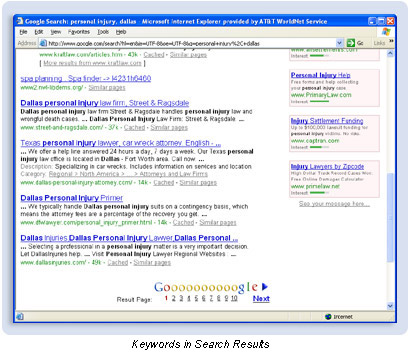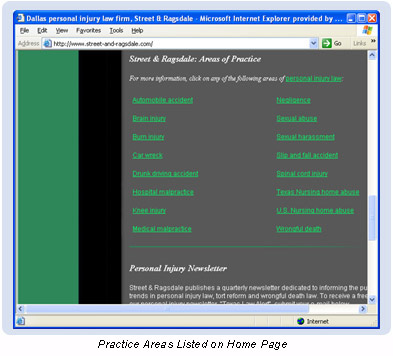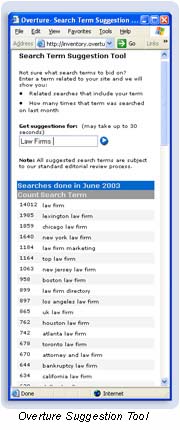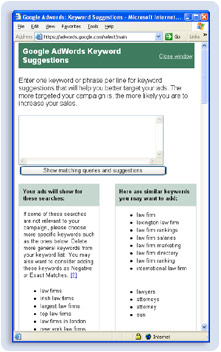| |
Keyword Selection
| Choosing Keywords & Phrases |
- Location - Where do you practice?
a. City or Cities, and Surrounding Cities
b. County or Counties
c. Metro Area(s)
d. State or States
- Practice Areas - What words and phrases describe your practice?
a. Exact Words
b. Related Words
c. Exact Phrases
d. Related Phrases
e. Singular /Plural Forms
f. Layperson v. Lawyer
g. Test words on Google and Overture
h. Group words and phrases into broad and small categories
- Terms from Client Interviews
What are the commonly used words your clients and other people use to describe a specific legal problem or your practice?
- Lawyer, Attorney, Lawyers, Attorneys, Law Firm, Law Firms
Use the singular terms "Lawyer" and "Attorney" in your title tags. All of the terms should appear somewhere within the content of your Web site, and if possible, all of the terms should appear within the content of your law firm's home page.
 |
Your Web site should contain content that represents your practice, philosophy and credentials. The quality and depth of this content will often determine whether or not a potential client hires you. Web site content is also very important as it relates to your search engine ranking -- it is your content that will be indexed by search engines. Therefore, the words and phrases contained in any of your online content should be chosen carefully to maximize your exposure in search engine results.
When researching and choosing keywords and phrases for the content of your Web site, it is important to understand the part they play in search engine optimization. If you optimize your site correctly, a search engine can essentially introduce you to a potential client. The keywords or phrases an Internet user enters as a part of his or her query begins this process. Matching these keywords to the words that appear on your Web site is the first step in a potential visit to your site. If your Web site's content does not include the words a user enters in his or her query, your site will not show up in the search engine result set (fn 1).
The two most important places on your Web site to have keywords or phrases are: 1) in the title tags (<title> title tag text </title>) located at the top of a Web page; and 2) in the text that is visible on the page between the body tags (<body> body content text </body>).
The content on your site should include an overview about your law firm, its location, practice specialties, firm members and, if it is well-established, the year your firm was founded. You should have at least one Web page for each practice area and each attorney in your firm. Information should include representative cases, recent verdicts, member associations, attorney undergraduate and law school education and certified legal specialties. Your firm should also have articles online that discuss certain legal issues or scenarios, as well as your practice philosophy and any specialty cases you may handle. And, if there is a certain type of case you handle that is receiving media attention in the news (for example an airplane crash or a drug recall), you should immediately get a page of information about the situation up on your site, briefly summarizing it on your home page with a link to an internal page.
Search engines take keywords and phrases collected when they spider Web sites and apply algorithms to them, which help them determine how to rank pages based on relevancy. Relevancy in this context means that the result set produced from a user's query (of keywords or phrases) is relevant to the specific information needs of that user. Thus, you should include words and phrases in your content that potential clients of your legal services would use to describe their legal issue or problem.
Within the content on your site, you will have the opportunity to place keywords and phrases. There are often a number of words or phrases that have the same meaning. From an SEO standpoint, you want to choose the words or phrases that are searched most often in relation to the number of pages on the Web that contain those words or phrases.
Keyword placement is discussed further in our Site Layout Section.
Researching Keywords and Phrases for Your Web Site
Choosing the best keywords and phrases to include on Web pages begins with careful and considered research of the information-seeking behavior of someone looking for legal services.
To attract non-lawyers to your Web site, you should include words or phrases that your clients and other laypeople, without specialized knowledge of a particular practice area or topic, would use in their search query to find your site.
Lawyers who understand terms of art associated with different practice areas may use different words (than non-lawyers) when they perform Internet searches, even when they are looking for information on the same topic. If one of your goals is to attract other lawyers or legal professionals to your site, you should consider including content in your site that contains keywords and phrases they would use when searching online.
Locality Keywords - City, County and State
If your practice is limited to a  certain locality, it is important that the cities, towns and counties in which you practice are mentioned as keywords on your site. certain locality, it is important that the cities, towns and counties in which you practice are mentioned as keywords on your site.
In general, you should include the state, metropolitan area, cities, and counties you serve within your Web site. For example, if you work in Ann Arbor, Michigan but have clients from Dexter, Saline and Ypsilanti, Michigan, you should reference those cities somewhere in the content of your site. You could describe your firm as, "A Personal Injury Law Firm, serving Washtenaw County, Michigan, including Ann Arbor, Dexter, Saline and Ypsilanti."
It is also advisable to include the area code(s) of your local phone service, as well as the zip code of your office(s), on your Web pages. This can be done simply by including your address and telephone number in a "Contact" area on your Web site, or on a specific "Contact Us" page. This can help increase your search engine ranking because people sometimes include an area code or zip code when searching for legal services on the Internet.
Practice Area Keywords and Phrases
It is important to have your practice areas, and words associated with those practice areas, in your Web site content.  For example, if you are a personal injury lawyer, you should include the words "personal injury," as well as words and phrases describing the types of cases you handle, such as "automobile accident," "dog bite," and "slip and fall," in your content. It is also smart to include variations of those words, such as "car," "motorcycle," "bike," "bicycle," "animal," "crash" and "collision." For example, if you are a personal injury lawyer, you should include the words "personal injury," as well as words and phrases describing the types of cases you handle, such as "automobile accident," "dog bite," and "slip and fall," in your content. It is also smart to include variations of those words, such as "car," "motorcycle," "bike," "bicycle," "animal," "crash" and "collision."
If you have some particular types of cases that you focus on, you should make sure that you have words associated with that type of case as well. For example, if you handle mesothelioma cases, you should include words and phrases such as "asbestos," "asbestosis," "lung cancer," "fibrosis" "insulation" and "fire retardant."
Using the Terms Lawyer, Attorney, Attorneys, Lawyers, Law Firm and Law Firms
To ensure that your Web pages appear when someone is searching specifically for an attorney, you should also use variations of the word lawyer through out your Web site. It is important to note that statistically, the word "Lawyer" is searched for more than the word "Attorney," while the word "Attorneys" is searched for more than the term "Lawyers". Note, however, that some of these searches are not necessarily for lawyers in private practice, but are for searches such as "attorney general" or "power of attorney forms".
We recommend that you use the terms lawyer, attorney, lawyers AND attorneys somewhere within your Web pages and, if possible, include all of these terms within the content of your home page.
Additional Keyword Tips
Here are some additional tips and factors to consider when determining what keywords to include in your site's content:
 As mentioned above, keep in mind the variety of words people might use to describe the same thing. For example, one person might search for "white collar lawyer," while another might search for "securities crime attorney." It is best to write down your practice areas and the words associated with these areas, and then start coming up with alternative words and phrases. As mentioned above, keep in mind the variety of words people might use to describe the same thing. For example, one person might search for "white collar lawyer," while another might search for "securities crime attorney." It is best to write down your practice areas and the words associated with these areas, and then start coming up with alternative words and phrases.
- Be aware that some queries from Internet users may include misspellings, acronyms and abbreviations. Are some of the keywords associated with your practice areas commonly misspelled (e.g. Fen-Fen v. Phen-Fen)? Is it likely or possible that people might use an acronym or abbreviation in searching for lawyers in your practice area (e.g., OSHA vs. Occupational Safety and Health Association, or "DUI" v. "driving under the influence" or "DWI" v. "driving while intoxicated")? If so, you should consider including relevant acronyms, abbreviations and, possibly, some common misspellings, in your keyword list.
- Think about word stems: are your keywords used in both singular and plural forms? If so, you might want to include both forms as keywords. Do people commonly use the stem of a word in their queries, rather than the word with the prefix or suffix commonly added to it? You should include all forms of a word related to your practice that will help the right users find you.
- Many search engines filter out common words (e.g., a, the, but, not) when running a query through their indices. It is best not to use these words when selecting your keywords and phrases, and to focus on specific, targeted words (use "Family Lawyer" and/or "Divorce Lawyer" for your terms, not "Family and Divorce Lawyer"). This is especially true for words used in the title tags <title> title tag text </title>.
- Think about the ways a user might put your keywords together in a phrase - are they more likely to do it one way over another? Try to order your keywords and phrases the way users would most commonly search for them.
- Look at any printed materials you have relating to your law firm - are there any words or phrases that appear repeatedly? If so, it is probably a good idea to use them as keywords and phrases, or at least use them as a starting point in making your keyword list.
- When you talk to clients, what words do they use to describe their legal problems? Are the same terms used by different people? You might want to include these keywords as well.
- If you have the option, consider either informal or formal usability testing. Ask a few people how they would find your Web site in a directory, and what words they might pick for a query if they used a search engine.
- Test out your keyword phrases by submitting them as queries in a variety of search engines. Look at the results - are they relevant to your practice? Are the results what you expect? Some search engines, such as AltaVista and Teoma have features that give you variations of search queries or links to similar searches - look at these for help in identifying similar keywords and phrases. Also, consider testing out your keywords and phrases by doing searches in specific directories. The results may be different than those generated by a search engine spider or crawler.
- Consider testing out your keywords and phrases with the Overture Suggestion Tool. This tool will help you see how many people searched for your keywords and phrases within a certain timeframe, and provide similar terms that might be worth using as your keywords. Running tests on a variety of words and phrases collected through your keyword research will help you find other variations of the same terms.

- Google also has a tool called AdWords Keyword Suggestions, as part of its AdWords program. You can run sample searches of keywords, and obtain suggestions for terms to use on your Web site.
- When you feel that you've collected as many relevant keywords and phrases as you can, put them together in a spreadsheet.
- Take some time to review the different words and phrases, paying careful attention to any natural practice and sub-practice area groupings or categories. Re-arrange the words and phrases to fit in a hierarchy with more general or broad topics at the top. Using the results of the word-tracking programs mentioned above, look at the number of times these words and phrases have been searched.
Once you've done your research and pared down the keywords and phrases you've collected to a reasonable number, it's time to place them effectively within the Web pages on your site.
Keyword placement is covered in our Site Layout section.
fn1. Sometimes your Web page may still show up in a Google result even if you do not have the keyword or phrase on your own Web page. The reason is that the keyword or phrase may be on a Web page that links to your Web page. Unless the word or phrase is relatively uncommon in the Google index, you are unlikely to be found for terms and phrases that are not on your Web page. |

 certain locality, it is important that the cities, towns and counties in which you practice are mentioned as keywords on your site.
certain locality, it is important that the cities, towns and counties in which you practice are mentioned as keywords on your site.
 For example, if you are a personal injury lawyer, you should include the words "personal injury," as well as words and phrases describing the types of cases you handle, such as "automobile accident," "dog bite," and "slip and fall," in your content. It is also smart to include variations of those words, such as "car," "motorcycle," "bike," "bicycle," "animal," "crash" and "collision."
For example, if you are a personal injury lawyer, you should include the words "personal injury," as well as words and phrases describing the types of cases you handle, such as "automobile accident," "dog bite," and "slip and fall," in your content. It is also smart to include variations of those words, such as "car," "motorcycle," "bike," "bicycle," "animal," "crash" and "collision."

